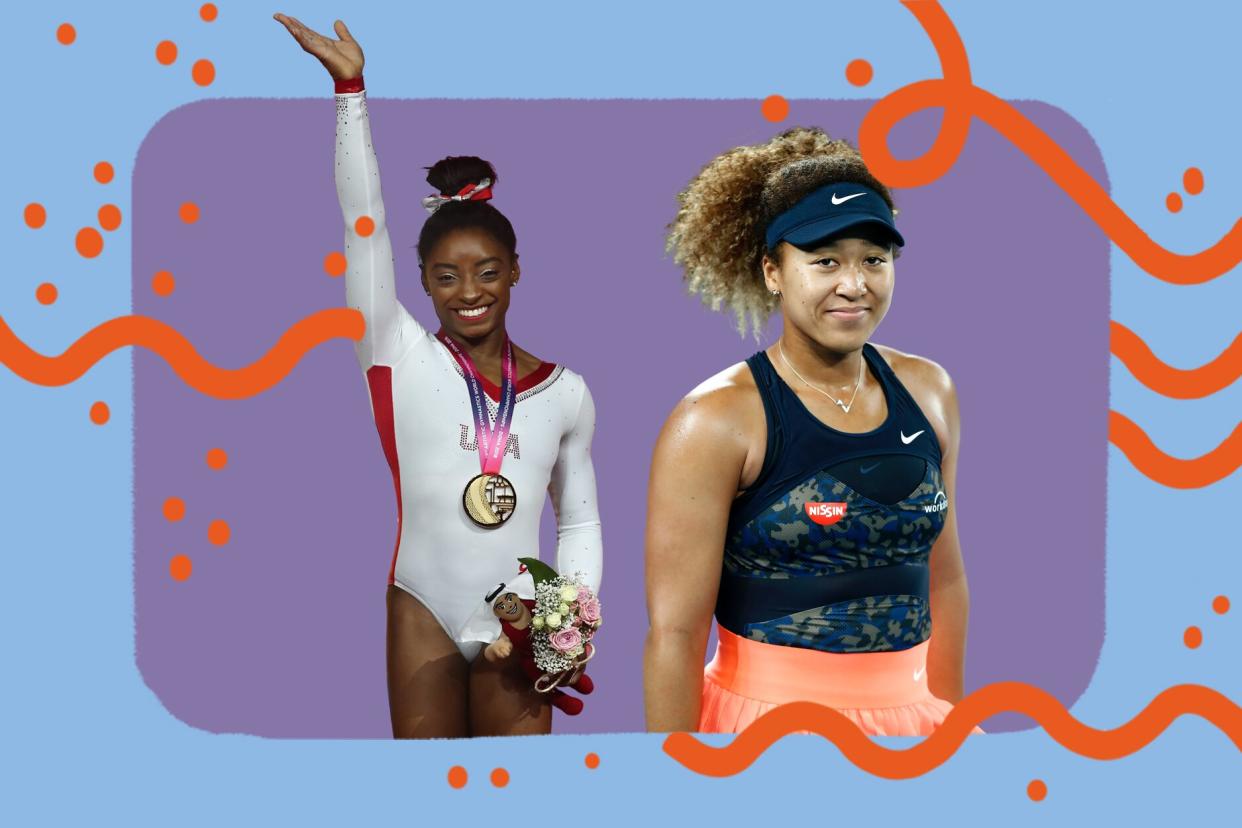I'm Raising My Black Daughters To Say No Like Simone Biles and Naomi Osaka

- Oops!Something went wrong.Please try again later.
Getty Images (2)
"How do you feel?"
This is a question I ask my daughters often. I ask it when they are frustrated and when they aren't doing something as well as they'd like. Even when they're doing great but seem a little off, I ask. I make it a point to prioritize their mental health so one day they'll be able to cut through the opinions of everyone around them to ask themselves the same question.
I don't personally know the village that raised Simone Biles and Naomi Osaka. Still, as a Black mama on the sidelines, I'm monumentally proud of them. I'm proud of them for advocating for their mental well-being in an industry that capitalizes off Black women's abilities but turns their back on our humanity.
Both women recently chose to withdraw from competing — Osaka from the French Open and Biles from a round of the Olympic gymnastic games — because of their sports' psychological impact.
After choosing not to do a post-game press conference in May, Osaka posted to her Instagram explaining that she gets "huge waves of anxiety before I speak to the world's media. I get rally nervous and find it stressful to always try to engage and give you the best answers I can." Reporters also frequently asked insensitive questions about her race and ethnicity. She went on, "I thought it was better to exercise self-care and skip the press conferences."
RELATED: We Need to Stop Pressuring Kids to Be the Best at Their Sport
At an Olympic press conference reported by USA Today, Biles, the most decorated gymnast in history, said, "I think we're just a little bit too stressed out, but we should be out here having fun, and sometimes that's not the case." This was putting it lightly, being that she'd worked her butt off to create more difficult moves just to have the judges shortchange her scores because she was said to be too good. She also said she didn't want to do something silly and hurt herself because of her headspace. Since withdrawing, she's been called a "selfish sociopath" and weak for not ignoring her well-being to "represent her country."
Whether others like it or not, these two have set a precedent for everyone watching, including our children — and it's a precedent that's essential for us to see.
Black communities have only recently started to normalize seeking help for our mental health. We attribute this to our exclusion from the mental health conversation, disparities in health care, the criminalization of mental illness, and negative stigmas. Statistically, Black Americans seek mental health care at half the rate of white Americans, according to the U.S. Department of Health and Human Services. That fact is even more concerning considering we are 20 percent more likely to experience mental health issues, according to Mental Health America.
RELATED: The Mental Load of the Black Mother
I didn't have examples like Biles and Osaka as a child. I wasn't taught to protect my mental health. I watched the adults around me experience emotional abuse and instability, suffer in silence, and push it under the carpet for the sake of family (or the team). I needed to see healthy disagreements. I needed my mom to tell me "no" because she needed a minute to take care of herself. I needed to see my female elders walk away from toxic situations.
So I'm setting a different example for my children.
Self-care isn't weakness. Leaving for the sake of your sanity isn't quitting, and saying no isn't selfish.
As Biles said in a press conference on Tuesday: "Put mental health first because if you don't, then you're not gonna enjoy your sport and you're not gonna succeed as much as you want to. So it's ok sometimes to even sit out the big competitions to focus on yourself… It shows how strong of a competitor and person you really are, rather than just battle through it."
Osaka and Biles don't owe any explanations beyond what they've already said.
While their courage and strength are something to be celebrated, it's also not the time for us to expect them to campaign for mental health. It's not what they need. Let them breathe. But it is a moment in history that I can point my little Black girls to so they can see how much they should matter to themselves first — even if it means saying, "no. I'll pass on that."

